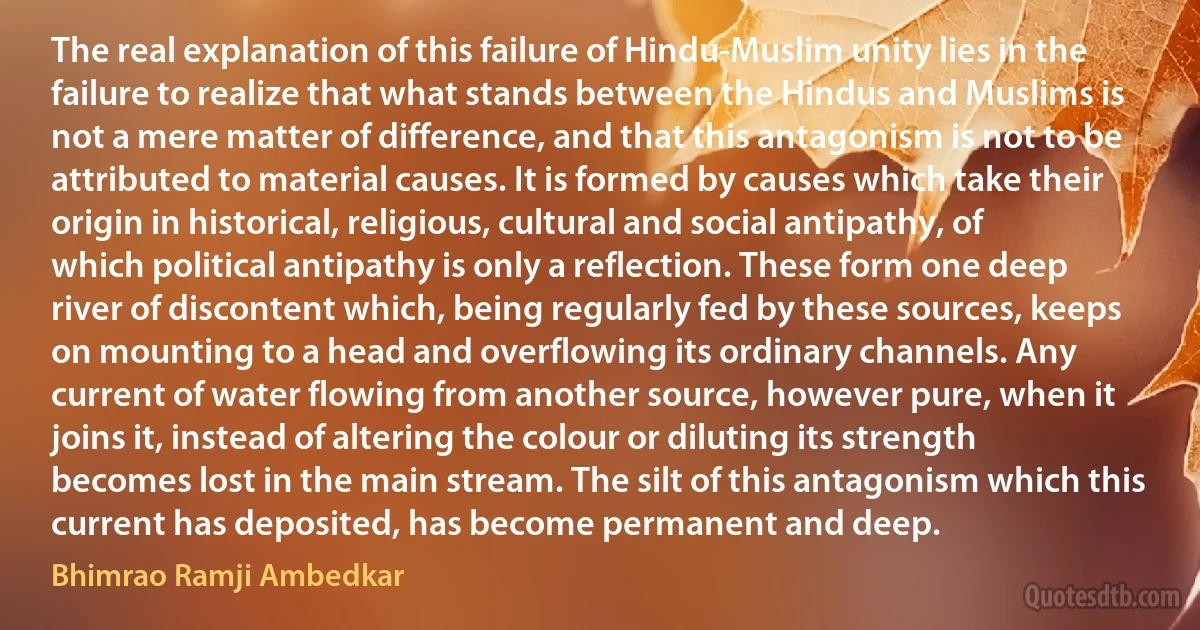
The real explanation of this failure of Hindu-Muslim unity lies in the failure to realize that what stands between the Hindus and Muslims is not a mere matter of difference, and that this antagonism is not to be attributed to material causes. It is formed by causes which take their origin in historical, religious, cultural and social antipathy, of which political antipathy is only a reflection. These form one deep river of discontent which, being regularly fed by these sources, keeps on mounting to a head and overflowing its ordinary channels. Any current of water flowing from another source, however pure, when it joins it, instead of altering the colour or diluting its strength becomes lost in the main stream. The silt of this antagonism which this current has deposited, has become permanent and deep.
Bhimrao Ramji AmbedkarRelated topics
altering antipathy deep difference failure fed form head historical lost matter mere pure real reflection river source stream strength take water lies channels keepsRelated quotes
I HAVE never met with a man, either in England or America, who hath not confessed his opinion, that a separation between the countries, would take place one time or other: And there is no instance, in which we have shewn less judgment, than in endeavouring to describe, what we call, the ripeness or fitness of the Continent for independance. As all men allow the measure, and vary only in their opinion of the time, let us, in order to remove mistakes, take a general survey of things, and endeavour, if possible, to find out the very time. But we need not go far, the inquiry ceases at once, for, the time hath found us. The general concurrence, the glorious union of all things prove the fact. It is not in numbers, but in unity, that our great strength lies; yet our present numbers are sufficient to repel the force of all the world.

Thomas Paine
Duckbills were supposedly croc-style swimmers, moving by strong, easy, side-to-side flexures of their tail. Therefore, the optimal design would feature vertical tail spines. But duckbill spines all slanted strongly backward, exactly as in land-living lizards, not in swimmers.
Another problem in the duckbill's swimming equipment lies in the profile of the tail. The deepest part of the croc's tail is close to the end, because the end swings through a wider arc than does the base in moving side to side. Thus the tail is deepest where it can do the most good in pushing against the water. All powerful tail-scullers have such deep tail ends. But duckbill tails were deepest at the hips and become progressively narrower from top-to-bottom toward the tip - another caudal feature nearly totally maladapted for its primary function.

Robert T. Bakker
In comparing civilized man with the animal world, one is as the Alpine traveller, who sees the mountains soaring into the sky and can hardly discern where the deep shadowed crags and roseate peaks end, and where the clouds of heaven begin. Surely the awe-struck voyager may be excused if, at first, he refuses to believe the geologist, who tells him that these glorious masses are, after all, the hardened mud of primeval seas, or the cooled slag of subterranean furnaces-of one substance with the dullest clay, but raised by inward forces to that place of proud and seemingly inaccessible glory. But the geologist is right; and due reflection on his teachings, instead of diminishing our reverence and our wonder, adds all the force of intellectual sublimity, to the mere aesthetic intuition of the uninstructed beholder.

Thomas Henry Huxley
Perhaps there is nobody who would sacrifice his life for the sake of maintaining that the three angles of a triangle are together equal to two right angles, for such a truth does not demand the sacrifice of our life; but, on the other hand, there are many who have lost their lives for the sake of maintaining their religious faith. Indeed, it is truer to say that martyrs make faith than that faith makes martyrs. For faith is not the mere adherence of the intellect to an abstract principle; it is not the recognition of a theoretical truth, the process in which the will merely sets in motion our faculty of comprehension; faith is an act of the will - it is a movement of the soul towards a practical truth, towards a person, towards something that makes us not merely comprehend life, but that makes us live.

Miguel de Unamuno
Let us imagine that the aboriginal-original human specimen was one of two brother apes, A and B; they were alike in every respect; both were animal space-binders; but something strange happened to B; he became the first time-binder, a human. ... He had thus a new faculty, he belonged to a new dimension; but, of course, he did not realize it; and because he had this new capacity he was able to analyze his brother "A"; he observed "A is my brother; he is an animal; but he is my brother; therefore, I AM AN ANIMAL." This fatal first conclusion, reached by false analogy, by neglecting a fact, has been the chief source of human woe for half a million years and it still survives. ... He [then] said to himself, "If I am an animal there is also in me something higher, a spark of some thing supernatural."

Alfred Korzybski
